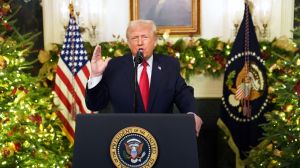Specific to India’s interest is a commitment by the US to exchange terrorist watch-lists, and target the use of fake currency and the Internet by terrorists. The two countries have also reiterated the need for Pakistan to bring the perpetrators of the Mumbai terror attacks to book.

The fine print in the seven-page joint statement issued on Tuesday shows that President Obama has pledged assistance on homeland security with modern technology to counter the threat of improvised explosive devices (IEDs). US-made mine-resistant, ambush-protected vehicles, are likely to help repel Maoist attacks.
In their joint media briefing at the Oval Office, the two leaders said their discussion covered a range of issues from resolving the impasse in WTO talks and job-led economic growth, to climate change and cooperation in defence and space.
Reaffirming their commitment to implement the civil nuclear agreement, they set up a Contact Group to expedite the setting up of US-built nuclear power plants in India.
“We already have the foundation of a strong partnership,” Modi, seated next to Obama, said. “We now have to revive the momentum and ensure that we get the best out of it for our people and for the world.”
The New York Times, however, reported that the Modi-Obama talks had yielded no solutions to thorny disputes over taxes, trade and civilian nuclear energy cooperation that have troubled the US and India in recent years. “And there was little sign that human rights — a particularly sensitive topic for Mr Modi, who has been accused of being complicit in deadly anti-Muslim riots — was a major item on the agenda,” the newspaper said.
Story continues below this ad
It quoted Josh Earnest, the White House press secretary, as having said at a media briefing, “Human rights and the importance of inclusive governance were part of the discussions between the President and the Prime Minister today.” The joint statement issued after the talks, however, made no mention of the issue, The New York Times added.
“The White House has grappled with the perceptions of a visit meant to spotlight the President’s high hopes for working with Mr Modi while not lavishing the full measure of White House pageantry on a leader who until recently was barred from entering the United States because of the allegations of human rights abuses more than a decade ago,” the newspaper said.
Concerns over China’s aggressive stance in the South China Sea were reflected in the joint statement, which said the two leaders had agreed to intensify cooperation in maritime security to ensure the freedom of navigation and unimpeded movement of lawful shipping and commercial activity.
Indian officials said the visit had been used to “intensify cooperation” in maritime security as well as to ungrade the existing bilateral exercise, Malabar.
Story continues below this ad
To increase investments by institutional investors and corporate entities, the leaders decided to set up an Indo-US Investment Initiative with special focus on capital market development and financing of infrastructure.
An Infrastructure Collaboration Platform will be convened to increase the participation by US firms in infrastructure projects in India. India has already offered US industry a lead partner role in developing smart cities in Ajmer, Visakhapatnam and Allahabad.
According to officials, India and the US have committed themselves to “consult closely” on global crises such as the ones in Syria and Iraq, and exchange information about their nationals returning from the conflict zones. While the Ministry of External Affairs pointed out that India had not joined the coalition of 40 countries against the ISIS, the joint statement does point to the dangers posed by the radical Islamist group.
The joint statement noted that the two leaders also expressed concern over Iran’s nuclear programme and South Korea’s nuclear weapons and ballistic missile programmes.
































